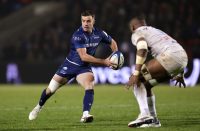 When it comes to being two-faced, Stuart Lancaster’s England win the prize hands down. The question is which face will we see when they kick off the 2013 autumn series against Australia at Twickenham on Saturday? Will it be the one battered into a bleeding mess by Wales, after their Six Nations Grand Slam aspirations were pulped in March, or the happy, smiling visage that was unmarked after a triumphant set-to with the All Blacks this time last year.
When it comes to being two-faced, Stuart Lancaster’s England win the prize hands down. The question is which face will we see when they kick off the 2013 autumn series against Australia at Twickenham on Saturday? Will it be the one battered into a bleeding mess by Wales, after their Six Nations Grand Slam aspirations were pulped in March, or the happy, smiling visage that was unmarked after a triumphant set-to with the All Blacks this time last year.
Given that the reverse in Cardiff is the most recent of the two matches, and even Lancaster’s faith was shaken by the magnitude of the Welsh victory, it is that setback which reverberates the most.
This England head coach and his earnest side has no shortage of cheerleaders. And I’d be happy to count myself among them with only two years until the World Cup – and still only one Northern Hemisphere winner of that tournament – if it did not require a total suspension of the critical faculties which underpin judgement.
The evidence that England are world champion material is in scant supply as we go into the autumn 2013 series against Australia, Argentina and New Zealand.
The biggest shortfall Lancaster has to address – and fast – is one of game-breakers, those out-of-the-ordinary players who can turn the balance of the game with moments of pace, power and perception.
those who think that Australia will be easy-beats, expecting England to dish out a Lions-style third Test trouncing of the Wallabies should consider the relative individual talents within the two sides.
England, with the possible exceptions of Alex Corbisiero at loosehead and Manu Tuilagi at centre, would not have a single candidate if a World 23 was to be picked tomorrow. Australia would have five worthy of consideration in Israel Folau, Will Genia, Adam Ashley-Cooper, David Pocock – who is still injured – and his precocious understudy, Michael Hooper.
The Wallabies also have two of the biggest ‘brat-pack’ mavericks in the game in Quade Cooper, the Reds fly-half who has been rehabilitated by new coach Ewen McKenzie, and James O’Connor, who has been shown the door by the ARU (temporarily), and has been linked since to a short-term contract with London Irish.
England have discovered to their cost that form in the Southern Hemisphere Rugby Championship is not always the best barometer of how hot Australia will be. Their recent 54-17 demolition of Argentina in Rosario, followed by a spirited effort in Dunedin against New Zealand – in which they scored three tries to the hosts four in going down 41-33 – suggests that their attacking game can still sizzle.
The Wallaby player most capable of burning England is Folau. The big cross-coder made an immediate impact during the Lions tour, and although George North won a split decision in the battle of the backline giants, the signs are that Folau has raised his game a couple of notches since then.
Folau’s hat-trick against the Pumas showcased an athleticism and natural footballing ability that, allied to his size, makes him one of the most dangerous counter-attacking forces on the world stage. That he lost nothing by comparison with New Zealand’s Israel Dagg in Dunedin simply emphasised his extraordinary attacking potential.

The difficulty for Lancaster is that while McKenzie prepares to launch Folau at England, his own biggest match-winner is on the sidelines recovering from a pectoral tear. The size of the void left by Manu Tuilagi’s injury is best measured by his contribution to England’s capacity to cross the try-line since he made his debut against Wales in the preparation games for the 2011 World Cup.
The Samoan-born centre scored in that game, and has so far accumulated a tally of 10 tries in 21 tests for his adopted country.
Just as significantly, his explosive power has created easily as many tries for his England team-mates, establishing him as the most potent offensive force in Lancaster’s side.
The upshot is that England have developed a dependency on Tuilagi’s ability not only to bounce defenders into the middle of next week to score tries from nowhere, but also to smash over the gain-line. Without him England will find quick front-foot ball and holes to exploit much harder to come by.
That they managed to do this well enough in Argentina over the summer is more a reflection of the weakness of the second string Pumas defence they faced, rather than a new-found ability to run rings around teams with greater speed, ferocity and accuracy in their tackle line.
For an instant measure of Tuilagi’s influence look no further than his contribution to that epic 38-21 victory over New Zealand. In eight supercharged minutes after half-time he wrenched the game out of All Black hands, first combining with Brad Barritt to put his fellow centre over, then making a devastating break to put Chris Ashton clean through, before delivering the killer blow with his own interception try off Kieran Read.
It is fair to say that without Tuilagi and the tornado he unleashed on New Zealand there would have been no victory for the Twickenham crowd to celebrate. He has the capacity to produce something special almost every Test he plays in, and his contribution is often underestimated.
However, there are also positives for England that should not be overlooked. Lancaster does have four players who are capable of pushing for places in a World 2nd XV in Tom Youngs, Courtney Lawes, Owen Farrell and Mike Brown – and, if Tom Croft had been fit, a fifth.
Youngs brings the intensity and commitment that should be used as a template for the rest of the squad. The impression that he is power-packed is emphasised by the fact that he is almost as wide as he is tall, and the Leicester hooker has an indomitable quality about him that is the hallmark of all outstanding Test forwards.
It is also important that after having a moan about the new scrummaging directives he has buckled down to the task and is learning the business of striking for the ball. It is an essential skill, and one, given his build and co-ordination, in which he should become accomplished.
If Youngs is an inspirational force in the front row, then Lawes is capable of doing the same for the back five of the scrum. England are not blessed with many turn-over tacklers but in Lawes they have one of the best. The Northampton lock combines ferocity and commitment with great timing, and again he should be used as a benchmark forthe rest of the squad, of whom too many are passive tacklers who take contact on the ball-carrier’s terms.

The bonus is that Lawes is also developing impressive all-round accomplishments, with his lineout work, carrying and appetite for hard graft marking him out as one of the best second row prospects in the Test arena. His consistency this season suggests that he is a forward who can reach the heights – and stay there.
with the removal of Tuilagi there will be a premium on England’s backs turning every scoring opportunity into points this autumn. This puts a greater burden of responsibility on the shoulders of Owen Farrell. The 22-year-old Saracens fly-half will have to show that he has distribution skills to rival his goal-kicking accomplishments and his stonewall defence.
Mike Brown is another back capable of sparking Lancaster’s attack, and part of his gift is his willingness to have a go. Inevitably, his desire to counter-attack from deep means that he occasionally runs into trouble, but Lancaster must emphasise that the key to counter-attack is others in white shirts working hard enough to get in behind Brown. That way, wherever he goes from England not only give him full licence, but are less likely to be exposed.
Aggressive defence and getting numbers and depth on the counter-attack are not English strengths, but they will be essential elements to any game-plan designed to beat Australia.
What will also be essential is for England to get a good return from the set-piece – and, as the Lions discovered, despite Australia’s wobbly Wallabies scrummaging reputation, superiority is not a given.
Neither Dan Cole nor Mako Vunipola were able to impose themselves at the scrum on the Lions tour, and Joe Marler was in trouble against the Wallaby scrum in the corresponding fixture last year. It is not that the Australian scrum is any great shakes, it is simply that England may not be strong enough to gain a clear ascendancy without Corbisierio.
England have won just one of their last four encounters with Australia at Twickenham, and, overall, the Wallabies are a bogey team for the men in white. Of the 41 Tests between the two countries Australia are ahead on the ledger with 24 wins to England’s 16.
Last autumn the Wallabies came off the ropes, following a brutal defeat by France, to beat an England side, including Tuilagi, 20-14 a week later on their own turf. This time they arrive match-hardened after a creditable away performance against the best side in the world.
Australia are a difficult foe, and, with Tuilagi out, England will have to find new ways of facing them down before the two teams meet in the 2015 World Cup pool of no return.






















